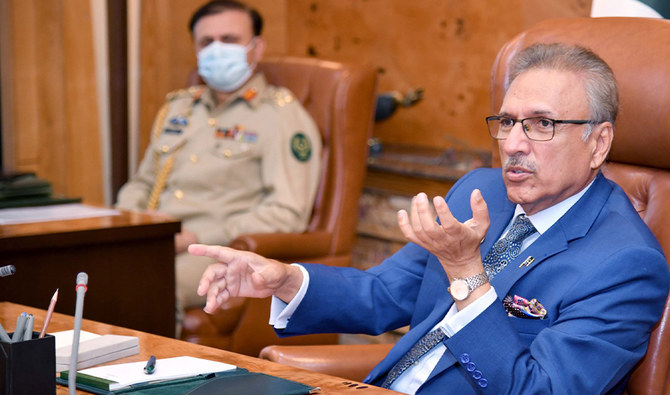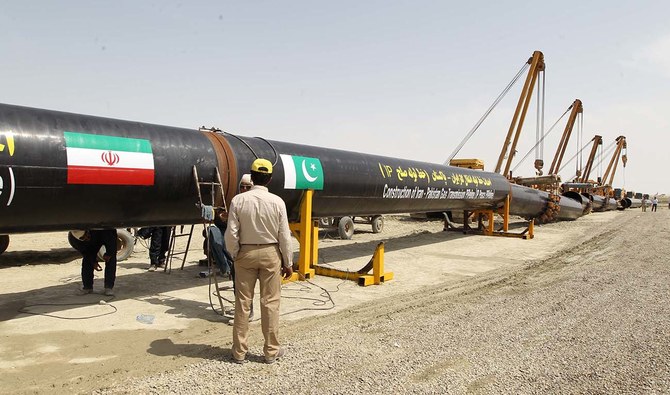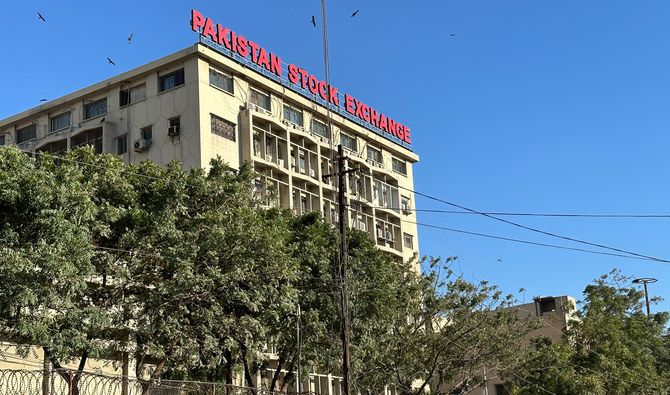ISLAMABAD: Pakistani President Dr. Arif Alvi has said what was being perceived as a “shift” in Prime Minister Imran Khan’s stance on Kashmir and talks with arch-rival India was a change in judgment due to changing circumstances, saying no one’s decisions should be “carved in stone.”
In an interview to Reuters on June 4, Khan said Pakistan was ready to restart talks with India if Delhi provided a roadmap toward restoring the previous status of the disputed Himalayan region of Kashmir.
The two nuclear-armed neighbors both control parts of Kashmir but claim it in full. In 2019, India withdrew Indian-ruled Kashmir’s autonomy in order to tighten its grip over the territory, sparking outrage in Pakistan, the downgrading of diplomatic ties and a suspension of bilateral trade.
Since then, Pakistan had maintained that it would be ready for talks with India only if it restored the original status of Kashmir.
In an interview aired on Monday night on a local TV channel, the host asked the president if there appeared to be a shift in the PM’s position on talks with India.
“This shift, that people sometimes call a U-turn ... according to new circumstances, on the basis of new reasons, due to changing circumstances, a person should change their judgment,” Alvi said, defending Khan’s statement to Reuters. “Sometimes it happens that you say I don’t want to talk to him, among friends for example ... then you will try that a third person will play a role to get you talking again.”
The president concluded that it was not right for anyone to make decisions “carved in stone.”
“Even if they give us a roadmap, that these are the steps that we will take to basically undo what they did, which is illegal, against international law and United Nations resolutions... then that is acceptable,” Khan had said in the Reuters interview. “If there is a roadmap, then, yes, we will talk.”
Kashmir has been a flashpoint since India and Pakistan gained independence from British rule in 1947, and they have fought two wars over the region. Pakistan accuses India of rights violations in Kashmir, and India says Pakistan supports militants in its part of the region. Both deny the charges.
In 2019, a suicide bombing of an Indian military convoy in Kashmir led to India sending warplanes to Pakistan.
Pakistan in March deferred a decision by its top economic decision-making body to restart trade with India until Delhi reviewed its moves in Kashmir.
Khan told Reuters that India had crossed a “red line” by revoking the autonomy of its part of Kashmir.
“They have to come back for us to resume dialogue,” Khan said, adding, “at the moment there is no response from India.”
PM Khan’s stance on Kashmir, India talks can change with changing circumstances — president
https://arab.news/5xpfk
PM Khan’s stance on Kashmir, India talks can change with changing circumstances — president

- Khan said recently Pakistan would restart talks with Delhi if it provided roadmap toward restoring previous status of Kashmir
- The statement has been perceived as “shift” in policy as Pakistan previously said no chance of talks until original status restored fully
Iran, Pakistan seek ways to complete gas pipeline project

- Both countries signed agreement to construct the pipeline from Iran’s South Fars gas field to Pakistan’s Balochistan, Sindh
- Tehran says has invested $2 bln to construct pipeline, but work on Pakistan side has been held up due to fears of US sanctions
KARACHI: Iran and Pakistan are looking at ways to complete a long-delayed gas pipeline project between the two countries, Iran’s Consul General to Pakistan, Hassan Nourian, said on Monday.
“We see political determination from Pakistan to complete the project,” he told reporters in the southern city of Karachi.
The countries signed an agreement to construct the pipeline from Iran’s South Fars gas field to Pakistan’s Balochistan and Sindh provinces in 2010, but work on Pakistan’s portion has been held up due to fears of US sanctions.
The 1,900 kilometer (1,180 mile) pipeline was meant to supply 750 million to one billion cubic feet per day of natural gas for 25 years to meet Pakistan’s rising energy needs.
Tehran says it has invested $2 billion to construct the pipeline on its territory. Pakistan, however, did not begin construction, citing international sanctions on Iran as the reason.
In 2014, Islamabad asked for a 10-year extension to build the pipeline, which expires in September this year. Iran can take Pakistan to international court, industry watchers have said.
Faced with potential legal action, Pakistan’s caretaker administration this year gave the go ahead in principal to commence plans to build an 80km segment of the pipeline.
In March, Islamabad said it would seek a US sanctions waiver for the pipeline. The US, however, said it did not support the project and cautioned about the risk of sanctions in doing business with Tehran.
Nourian on Monday said the pipeline did not come under international restrictions, and that the two countries were discussing the issue.
He did not answer a question about the potential for Iran to take legal action against Pakistan if it did not complete its side of the pipeline this year.
Pakistan, whose domestic and industrial users rely on natural gas for heating and energy needs, is in dire need for cheap gas with its own reserves dwindling fast and LNG deals making supplies expensive amidst high inflation.
Iran has the world’s second-largest gas reserves after Russia, according to BP’s Statistical Review of World Energy, but sanctions by the West, political turmoil and construction delays have slowed its development as an exporter.
ICC shortlists Pakistan’s Shaheen Afridi, UAE’s Waseem for Player of the Month award

- Shaheen Shah Afridi took eight wickets in last month’s T20I home series against New Zealand
- UAE’s Mohammad Waseem smashed 56-ball century in last month’s ACC Premier Cup final
ISLAMABAD: Pakistan’s pace sensation Shaheen Shah Afridi and UAE batter Muhammad Waseem have been shortlisted for the ICC Player of the Month award for April 2024, the International Cricket Council (ICC) reported on Monday, after the left-arm bowler’s string of impressive performances against New Zealand last month.
Afridi led Pakistan’s pace attack against New Zealand in a home T20I series against the Black Caps in April. Pakistan failed to win the series against a second-string New Zealand squad but drew 2-2 against Michael Bracewell’s squad.
The left-arm pacer, however, played a key role in Pakistan’s victories in two of the five matches played between the teams.
The second T20I saw Afridi blitz through the Blackcaps batting lineup, taking three for 13 as Pakistan registered a dominant victory. Then, trailing in the series for the fifth and final contest, Afridi once again wreaked havoc, taking four for 30 to salvage the series draw. Eight wickets in the series at an average of 10.00 saw Afridi walk away with the Player of the Series prize.
“Shaheen picked up the only wicket in the rain-affected opening match of the series with the Kiwis and then followed that up with two eye-catching efforts in the second and fifth games of the series in Rawalpindi and Lahore,” the ICC said in a report.
“Eight wickets in the series at an average of 10.00 saw Afridi walk away with the Player of the Series prize.”
UAE’s pinch-hitter Waseem is also among the three nominees from the men’s category after scoring bulk runs at the ACC Premier Cup and helping himself to a third T20I century in April. Waseem started the month with a first-ball duck against Kuwait before the 30-year-old quickly found form at the top of the UAE batting order as he helped himself to innings of 65, 45 and 48 in three consecutive matches.
“But Waseem’s highlight of the month came in the final of the ACC Premier Cup as he smashed six fours and a whopping seven sixes in making his third T20I century from just 56 deliveries and helping UAE to an impressive 55-run triumph over Oman,” the ICC said.
Namibia’s Gerhard Erasmus is the third nominee shortlisted by the ICC for his impressive performances during the team’s tour of Oman in April.
Erasmus produced two Player of the Match performances over the course of the five-match T20I series, with his first one coming in a narrow six-run loss in the second game of the series when the versatile all-rounder hit 58 from 56 deliveries and backed that up with a spell that netted 3/7.
However, in the decisive fifth match, Erasmus smashed six sixes when scoring a quickfire 64 from 29 deliveries and then made a pair of crucial breakthroughs as Namibia clinched the series with an emphatic 62-run triumph.
Afridi, who has 81 wickets from 61 T20Is, will be Pakistan’s pace attack leader as the green shirts take on Ireland and England in two away series this month. Pakistan will then head to the US and West Indies where they are scheduled to compete in the ICC T20 World Cup 2024.
Pakistan top court suspends verdict denying reserved parliamentary seats to Khan-backed party

- Under election rules, parties are allotted reserved seats in proportion to number of parliamentary seats they win in polls
- Election Commission ruled in March Khan-backed SIC was not eligible for reserved seats, Peshawar High Court upheld ruling
ISLAMABAD: Pakistan’s top court on Monday suspended a verdict by the Peshawar High Court (PHC) that a party aligned with candidates backed by former premier Imran Khan was not eligible for reserved seats in the legislature, a blow for the country’s coalition government headed by Prime Minister Shehbaz Sharif.
Khan’s Pakistan Tehreek-e-Insaf (PTI) party couldn’t contest the Feb. 8 elections under its traditional electoral symbol, a cricket bat, which it was denied on technical grounds. The PTI subsequently struck an alliance with another party, the Sunni Ittehad Council (SIC), in a bid to secure reserved seats for women and minorities in parliament.
Under Pakistan’s election rules, political parties are allotted reserved seats in proportion to the number of parliamentary seats they win in the election. This completes the National Assembly’s total strength of 336 seats.
The Election Commission had ruled in March that the SIC was not eligible for reserved seats, a decision the alliance had appealed in the PHC, which also rejected it. The SIC then approached the Supreme Court to appeal the high court’s decision.
A three-member bench of the top court took up the SIC’s petition for hearing on Monday.
“The Supreme Court has suspended the Election Commission’s order and the Peshawar High Court’s order,” PTI Chairman Gohar Khan, who is also Khan’s lawyer, told reporters outside the top court after it rejected the PHC verdict. “This is a vindication of our stance.”
He said the Supreme Court had also barred members of other political parties elected on reserved seats that should have been allotted to the SIC from casting their votes for or against any legislation.
The PTI leader said the SIC had been deprived of 67 reserved seats for women and 11 parliamentary seats for minorities. After losing 78 reserved seats, PM Sharif’s coalition government had lost its two-thirds majority, he added.
Khan, who is in jail following a string of convictions, and his PTI say the party was stripped of its bat symbol as a ruse to undermine its popularity and keep it from winning a maximum number of seats in general elections.
In February, an agreement between Bhutto Zardari’s Pakistan Peoples Party (PPP) and the Pakistan Muslim League-Nawaz (PML-N) of three-time Premier Nawaz Sharif ended days of uncertainty and negotiations after the Feb. 8 elections produced a hung national assembly.
The PML-N’s 79 and the PPP’s 54 seats together made a simple majority in parliament to form a government and they also roped in smaller parties in the coalition.
Candidates backed by Khan won 93 seats but did not have the numbers to form a government. He and his party have rejected the results of the elections, alleging widespread rigging.
Pakistan’s benchmark share index rises as much as 1.5%

- Pakistan’s benchmark share index has surged 73.4% over the past year, up 12.9% year-to-date
- Market reacting to Saudi business delegation’s arrival, IMF statement on mission visit, says analyst
KARACHI: Pakistan’s benchmark share index rose 1.5% during intraday trade on Monday, to an intraday high of 72,986 points.
The index has surged 73.4% over the past year and is up 12.9% year-to-date.
A Saudi delegation arrived in Pakistan on Sunday for talks on trade and investment opportunities, particularly in the exploration and production sectors.
Adnan Sheikh, assistant vice president at Pak Kuwait Investment Company, said the market was up following news of the delegation’s arrival along with an IMF statement regarding a mission visit.
“The PSX is still very cheap with price to earnings ratio of under 5x compared to average of 8x,” Sheikh added.
Pakistan last month completed a short-term $3 billion program, which helped stave off sovereign default, but the government of Prime Minister Shehbaz Sharif has stressed the need for a new longer term program.
An International Monetary Fund mission is expected to visit Pakistan this month to discuss a program, the lender said on Sunday ahead of Islamabad beginning its annual budget-making process for the next financial year.
The IMF did not specify the dates of the visit, nor the size or duration of the program.
Earlier, in an interview with Reuters, Finance Minister Muhammad Aurangzeb said the country hoped to agree the outlines of a new IMF loan in May.
Pakistan is expected to seek at least $6 billion and request additional financing from the Fund under the Resilience and Sustainability Trust.
Saudi officials arrive in Karachi to carry out immigration procedures under Makkah Route Initiative

- Makkah Route Initiative allows for completion of immigration procedures at pilgrims’ country of departure
- A total of 65,000 pilgrims in Karachi, Islamabad are expected to utilize Makkah Route Initiative during this year’s Hajj
ISLAMABAD: Saudi officials arrived in the southern port city of Karachi on Monday to carry out immigration procedures under the Makkah Route Initiative for Hajj pilgrims, the Pakistan Civil Aviation Authority (PCAA) said.
Pakistani officials confirmed in April Saudi Arabia’s decision to approve the Makkah Route Initiative’s expansion to the airport in Karachi, the country’s most populous city. Launched in 2019, the program was initially extended only to the airport in Islamabad.
The Makkah Route Initiative allows for the completion of immigration procedures at the pilgrims’ country of departure, making it possible to bypass long immigration and customs checks on reaching Saudi Arabia. The facility significantly reduces waiting times and makes the entry process smoother and faster.
“A group of 44 Saudi immigration officials has arrived in Karachi as part of the Road to Makkah Project,” PCAA said in a statement. “The immigration team will carry out Saudi immigration procedures for Hajj pilgrims at Karachi airport who are traveling under the Road to Makkah Project.”
The Saudi immigration officials were welcomed by the acting counsel general of Saudi Arabia in Karachi, the director of Hajj in Pakistan, representatives of the Airport Security Force, Pakistan Customs, Anti-Narcotics Force, Border Health Services, and the Federal Investigation Agency.
Pakistan’s religious affairs secretary told a media briefing in April that a total of 65,000 Hajj pilgrims would utilize the Makkah Route Initiative at Karachi and Islamabad airports this year. The official said 41,000 of the 65,000 pilgrims will make use of the facility under the government’s Hajj scheme, while the remaining 24,000 will rely on private tour operators.
A total of 29,500 pilgrims will use the facility from Islamabad while 35,500 will be able to avail it from the Jinnah International Airport in Karachi.
Saudi Arabia last year restored Pakistan’s pre-pandemic Hajj quota of 179,210 pilgrims and abolished the upper age limit of 65. More than 81,000 Pakistani pilgrims performed Hajj under the government scheme in 2023, while the rest used private tour operators.
Pakistan will launch Hajj 2024 operations from May 9 in eight airports across the country till June 9. This year’s pilgrimage is expected to take place from June 14-19.










